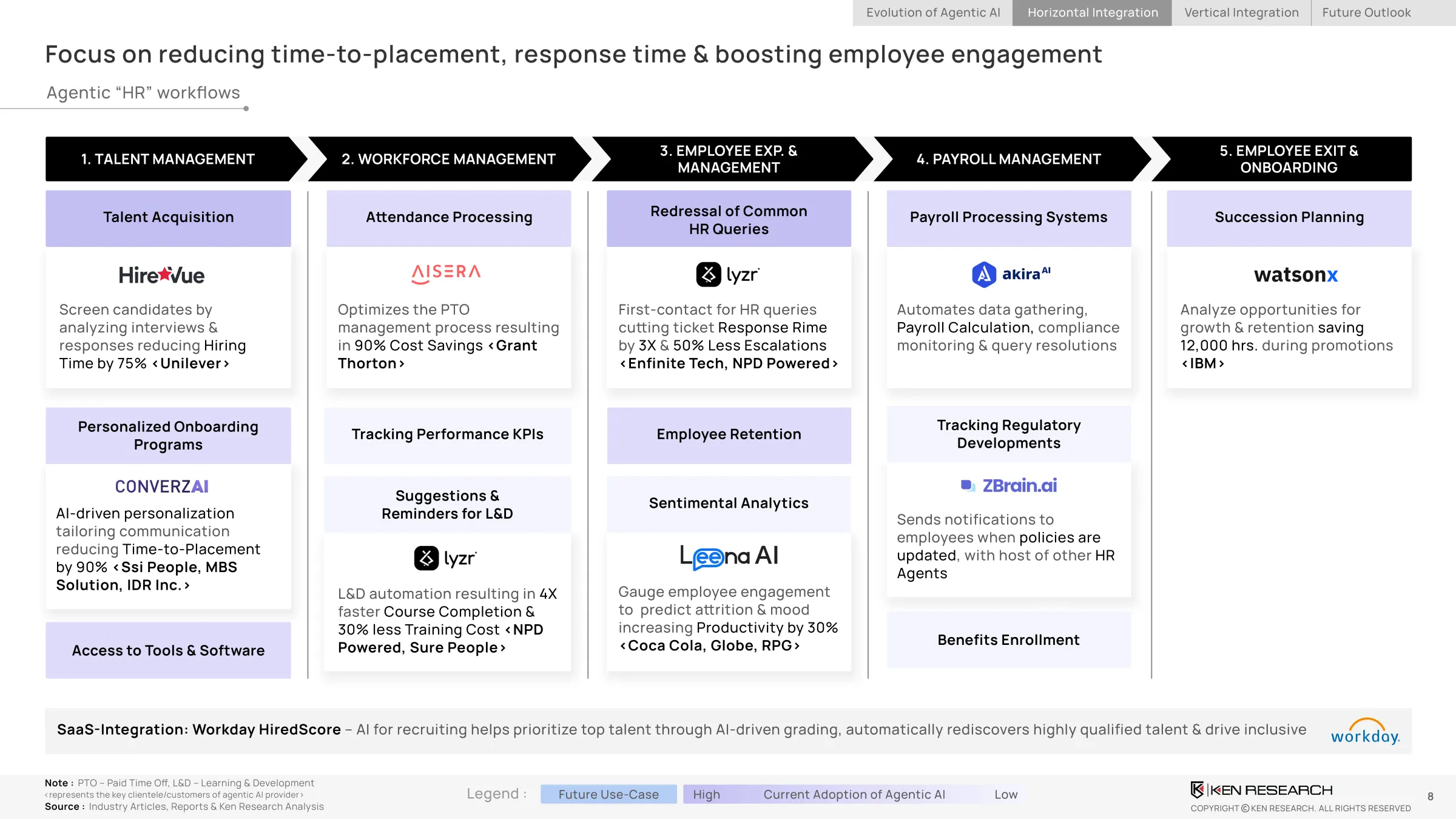How Agentic AI is Transforming Enterprise Workflows and Market Strategy
A Strategic Point of View for Decision-Makers in the AI Market Economy





















Built for Leaders Across
This POV is designed for:
- CXOs & Chief Strategy Officers overseeing enterprise transformation
- Venture Capital & Private Equity Firms evaluating AI-first portfolios
- Chief Innovation Officers & Heads of AI Labs building autonomous systems
- Digital Transformation Heads in BFSI, Retail, Healthcare, and Manufacturing
- Founders of SaaS, Cloud, or Automation Startups navigating product-market-AI fit
If you're driving the future of work, operations, or product—this POV gives you the blueprint
Executive Summary
Agentic AI isn’t a future technology—it’s here. Enterprises deploying autonomous AI agents are gaining exponential efficiency across departments.
Ken Research’s POV distills proprietary research, global case studies, and workflow-level analytics to show how AI agents are reprogramming enterprise operating models.
The POV includes:
- A comprehensive breakdown of 100+ agentic use cases
- Sector-specific benchmarks showing cost savings and efficiency jumps
- ROI comparisons of traditional software vs outcome-based agent stacks
Example insights:
- Unilevercut time-to-hire by75%using AI-led interviews
- IBMsaved over12,000 hoursvia agent-based promotions tracking
- Coca-Cola & RPGimproved productivity by30%using sentiment detection
- JBI Interiorsautomated93%of financial reporting workflows
- Grant Thorntonrealized a90% dropin HR ticket handling costs
- Moneyviewreduced cost-per-lead by80%while booking5X more meetings
- Hitachicut compliance costs by70%, improving audit accuracy

The Shift: Why Agentic Ai Is Different
Agentic AI is the leap from reactive tools to proactive intelligence:
- Agents interpret goals, monitor outcomes, and act without scripts
- They connect vertically (e.g. retail inventory) and horizontally (e.g. HR + Finance)
- They unlockas-a-service autonomy, turning operations into fluid intelligence hubs
Expected adoption trends:
- 33%of enterprise software to include agentic functions by2028
- 25%of GenAI deployments to include autonomous agents by2025
- Agentic AI projected to deliver$60B+in operational savings by2027across top 5 verticals
Discover the full Agentic AI roadmap—from use cases to market projections
Functional Impact: 6 Departments, 1 Ai Infrastructure
Across every function, Agentic AI delivers:
HR & People Ops
- 90% faster onboarding (IDR Inc.)
- 4X course completions with 30% lower L&D costs (SurePeople)
Sales & Marketing
- 80% outbound automation (bioaccess, DayZero)
- 200Mn+ profiles analyzed for cold outreach (Phocas Software)
Finance & Compliance
- 93% task reduction in real-time financial reporting (JBI Interiors)
- 70% cost cut in regulatory monitoring (Hitachi, Avi Medical)
Customer Service
- 3X faster ticket resolution (Enfinite Tech)
- 50% fewer escalations via AI-driven HR query redressal
Supply Chain & Procurement
- 50% shorter PO cycle times (Dropbox)
- 20% lower maintenance costs through predictive scheduling (Uptake)
IT Ops & Dev Automation
- 90% task accuracy in auto-testing & system alerts (CrewAI frameworks)
Industry Applications: Where Ai Agents Thrive
BFSI
- Automates fraud detection, onboarding, risk modeling
- $800K savedper fraud prevention incident (Suncoast Credit)
Download Industry Impact Matrix Now
Retail & E-Commerce
- 85% boost in campaign performance (SmartKargo)
- 90+ language support enabling 30% more productivity (Shopify AI)
Manufacturing
- Predictive maintenance improves asset uptime by20–25%
- Adaptive product design based on customer preference mapping
Healthcare & Life Sciences
- Agentic diagnostics for treatment recommendations
- Workflow orchestration from patient intake to lab management
Next: Building A Strategy For Agentic Transformation
Your next-gen tech stack should include:
- Autonomous Agents for goal-driven execution
- Agent-Orchestration Layers across functions
- Data Lakes + Action Layers that self-improve via feedback loops
- Flexible ROI Models: Outcome-first, not seat-first
Roadmap tools inside the POV:
· Maturity framework: Crawl → Run → Automate → Agent
· Budget models for shifting from SaaS to Agentic systems
· 12-week pilot plans for AI agent onboarding by function
The Future Is Agent-Driven
Agentic AI isn’t just another tech wave. It’s a redefinition of execution, decision-making, and scale. The enterprises winning in 2025 and beyond will:
· Replace tickets with triggers
· Swap dashboards for decisions
· Reduce layers of human approvals with AI orchestration
Final Takeaways:
· 5X growth in agent-first platforms forecasted in 3 years
· VC interest in Agent-based SaaS models up 240% (Q4 vs Q3, 2024)
· CEOs referencing Agentic AI in earnings calls surged 3X YoY
Download the Full Agentic AI POV – 15 Slides of Enterprise Intelligence
FAQ's
Still Got Questions? Connect Via Mail
What is Agentic AI?
Agentic AI refers to autonomous AI systems that can understand goals, make decisions, and act independently without constant human input.
What are real business benefits of AI agents?
AI agents boost efficiency, cut costs, and speed up operations—examples include 90% faster onboarding, 70% lower compliance costs, and 80% automated lead generation.
How do companies implement Agentic AI?
Companies start with pilot use cases in HR, finance, or sales, then scale using agent orchestration layers and feedback-based improvement systems.
What’s the difference between GenAI and Agentic AI?
GenAI creates content; Agentic AI acts. Agentic AI uses GenAI but adds autonomy—executing tasks, adapting to goals, and coordinating across systems.















